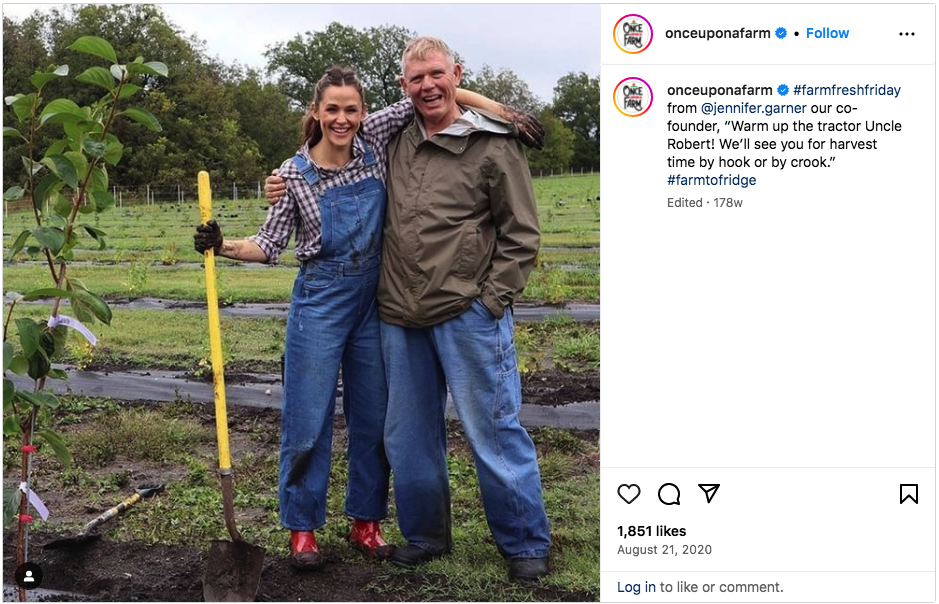Jennifer Garner is one of the most loved celebrities because of how relatable and approachable she seems. Her Instagram account is brimming with wholesome content about being a mother and navigating through life.
Patricia English Garner is Jennifer Garner’s mother. As a young girl, Patricia had a lot of sweet memories of growing up at a farm in Locust Grove, Oklahoma.
She even recalls how her parents bought the piece of land that has stayed in their family for generations. Her parents bought the piece of land in 1936, with a bonus her father had received from fighting in World War I.
69
The family had only $700 to purchase the land at the time. She recalls how her veteran father and mother did not even have a car at the time they bought the land. They had to hire someone to take them to the property.
“My parents didn’t even have a car, so when they heard about the land that was for sale, they hired someone to drive them to the property. The farm consisted of a two-room house and 20 acres–minus 1 acre at the heart of the property, which was a Native American cemetery,” Patricia said.
Mother told me the story of Dad leaning on his heels and negotiating all day over $20. When they finally agreed on a price, the deal was sealed, and the land was purchased. It’s been in our family ever since,” she ended.

Over the years as everyone grew up and moved away, the farm did not have one set of owners. It kept switching ownership from one family member to another as it was bought and sold repeatedly. Then finally, in 2017, Jennifer Garner decided to purchase the farm herself.
And she did not just purchase the farm for the sake of memory but she had the vision to turn it into a profitable business once again. To do so, she hired her uncle Robert and aunt Janet, who had previously owned the farm to help her with it.
It had been 40 years since the farm had been planted and tended to. In the past, her mother and her siblings had been avid farmers and sold pecans as well as grew lettuce, radishes, and potatoes.
And Jennifer wanted to bring that back. She established “Once Upon a Farm” with co-founders Ari Raz, John Foraker, and Cassandra Curtis. The idea was to grow organic fruits and vegetables that could be made into nutritious food for children.

She said she had been dreaming about the project for a while, “once upon a time… we dreamed of bringing baby food back to the roots with organic fruits and veggies harvested from local farmers, blended with love and served fresh from the fridge. We dreamed of feeling less stressed about mealtimes because we could feed our little ones foods that give them all the nutrients they need – and then some!”
Jennifer says giving busy moms access to nutritious food is important to her.
The company was started in 2018 and since then has been majorly successful. Their products are stocked at some of the biggest retailers in America and are also sold online on the company’s website.
Personality Test: Which Animal Did You See First?
Have you ever looked at an image filled with hidden animals and wondered why one caught your attention first? This personality test is designed to reveal fascinating insights about your character based on the first animal you notice. Get ready to unlock the secrets of your subconscious mind!
The Power of Visual Perception in Personality Tests

Our minds are wired to process visual information differently, which is why some people instantly see a lion, while others spot a bird or a turtle. The animal you identify first can reveal your strengths, emotions, decision-making tendencies, and even hidden traits you never knew you had.
Are you ready to dive into this fun and insightful test? Look at the image, identify the first animal you see, and then check what it says about your personality!
What Did You See First? Here’s What It Says About You!
Lion – The Fearless Leader
If the lion was the first animal you noticed, you possess strong leadership qualities. You are bold, confident, and never back down from a challenge. Just like the king of the jungle, you have a commanding presence and a natural ability to inspire others. Your determination and resilience help you overcome obstacles with ease.
Key Traits: Courageous, ambitious, authoritative, determined, and highly influential.
Video : The First Animal You See Will Determine Your Personality
Moose – The Graceful Guardian
Spotting a moose first suggests you are calm, wise, and deeply connected to family and traditions. You have a strong sense of pride and resilience, yet you exude a peaceful energy. People appreciate your kindness and reliability, making you a pillar of support for those around you.
Key Traits: Loyal, composed, humble, compassionate, and deeply intuitive.
Bear – The Balanced Protector
If a bear was the first animal you saw, you have a harmonious mix of strength and gentleness. You are protective of your loved ones but also enjoy solitude. Your introspective nature allows you to analyze situations before taking action, and when needed, you can be a force to be reckoned with.
Key Traits: Protective, wise, independent, emotionally strong, and balanced.
Eagle – The Visionary Thinker
Seeing an eagle first means you are sharp-minded, ambitious, and focused on the bigger picture. Just like the eagle soars high in the sky, you have an analytical mind that allows you to see things from different perspectives. You are determined to achieve your goals and have an innate sense of purpose.
Key Traits: Strategic, intelligent, ambitious, highly observant, and goal-oriented.
Rhinoceros – The Resilient Fighter
If the rhinoceros caught your eye, you are strong-willed and determined. You don’t let obstacles deter you from your path and always stand firm in your beliefs. You have a natural ability to push through difficult times, making you an unstoppable force when pursuing your ambitions.
Key Traits: Resilient, determined, strong, loyal, and unwavering.
Shark – The Fearless Competitor
If the first animal you saw was a shark, you are fiercely independent and highly competitive. You trust your instincts and are not afraid to take risks. You thrive in fast-paced environments and love a good challenge. Your ability to adapt quickly makes you a formidable force in any situation.
Key Traits: Determined, fearless, adaptable, intelligent, and relentless.
Giraffe – The Elegant Observer
Seeing a giraffe first suggests that you have a calm and elegant personality. You take a broad view of life, valuing deep connections and meaningful relationships. You are empathetic and thoughtful, always considering the needs of others before making decisions.
Key Traits: Graceful, understanding, insightful, peaceful, and compassionate.
Turtle – The Patient and Steady
If the turtle was the first animal you noticed, you are patient, persistent, and deeply introspective. You believe in long-term rewards rather than instant gratification. Stability is important to you, and you value consistency in your personal and professional life.
Key Traits: Patient, wise, calm, stable, and methodical.
Video : The First Animal You See Reveals Your Personality Type
Hare – The Energetic Explorer
If you saw the hare first, you have a quick mind and a curious nature. You enjoy learning, exploring, and trying new things. Your playful and spontaneous energy makes you a joy to be around, and you easily adapt to different environments.
Key Traits: Energetic, curious, quick-witted, adventurous, and fun-loving.
Dog/Wolf – The Loyal Protector
Spotting a dog or wolf means you are loyal, devoted, and protective of your loved ones. You have a deep sense of responsibility and value strong connections. Whether you’re part of a team or leading one, people trust you for your honesty and dependability.
Key Traits: Loyal, caring, protective, trustworthy, and social.
Seal – The Playful Free Spirit
If the seal was the first animal you noticed, you have a fun-loving and adaptable nature. You go with the flow and embrace life’s adventures. Your personality is flexible, and you find joy in the little things. People are naturally drawn to your charm and positivity.
Key Traits: Playful, adaptable, easygoing, friendly, and optimistic.
What Does Your Animal Reveal About You?
While this test is a fun way to explore your personality, it’s important to remember that human beings are complex. No single trait defines you completely, but these insights can help you understand your natural inclinations.
So, which animal did you see first? Let us know and see if it matches your personality! Whether you’re a strong leader like the lion, a deep thinker like the eagle, or a fun-loving spirit like the seal, every personality is unique and special.
Enjoy this journey of self-discovery, and embrace the qualities that make you one of a kind!



Leave a Reply